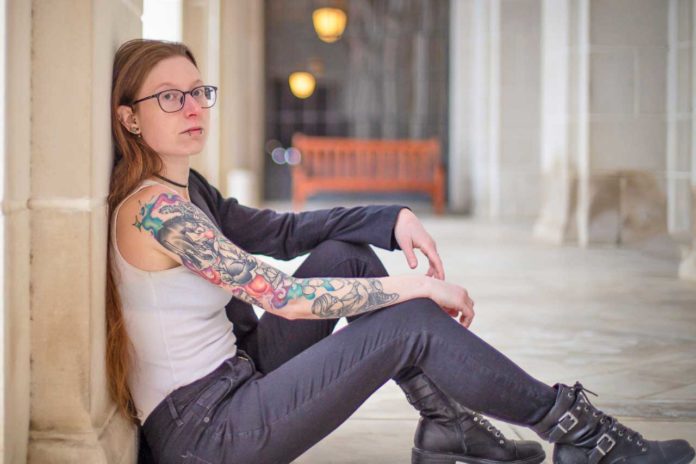Allentown’s Bradbury-Sullivan LGBT Community Center will host a queer novel miniseries during which four LGBTQ+ authors will discuss their recently published books. Starting June 1 and recurring weekly until June 22, community members can tune into Bradbury-Sullivan Center’s Facebook Live to enjoy excerpt readings of John Elizabeth Stintzi’s “Vanishing Monuments,” Carter Sickels’ “The Prettiest Star,” Ilana Masad’s “All My Mother’s Lovers” and Corinne Manning’s “We Had No Rules.” The authors will also answer audience questions via the Facebook Live chat feature.
Although its physical doors are closed, Bradbury-Sullivan Center has been hosting a variety of virtual programs during this time of social distancing, including support groups, youth programs and literary reading groups. The upcoming queer novel series is a new program offered through Bradbury-Sullivan Center’s library.
“We wanted to pick books that were getting rave reviews because we wanted this to be a series that feels exciting, that the authors might be people that community members in the Lehigh Valley or Philadelphia might even travel to an event to hear them do a book reading,” said Adrian Shanker, Bradbury-Sullivan Center’s founder and executive director.

Stintzi’s “Vanishing Monuments,” tells the story of Alani Baum, a nonbinary photographer and teacher who, after running away with their girlfriend almost 30 years prior, reconnects with their mother whose dementia renders her unable to speak. Stintzi writes the novel through the lens of Alani navigating their memories that come flooding back to them while living in their mother’s house, and how their memories shed light on their nonbinary identity.
As Stintzi wrote the novel and read literature about transness and gender fluidity, they came to discover their own nonbinary identity, they told PGN.
“Working with the characters [who are] genderfluid and nonbinary, at the time I started writing it, I didn’t fully grasp how I identified anywhere close to that,” Stintzi said. “[The novel] is very much about memory and the instability of memory, and memory’s connection to identity. I wanted to complicate that idea of identity, and it seemed like a genderfluid character would be a good way of embodying that. As I became more familiar with trans literature, I was like, ‘oh s–t, I guess this is also what I am,’ [but] not in the same way as the character.”

Sickels’ “The Prettiest Star” zooms in on a young gay man living during the 1980s AIDS crisis, who moves from New York City back to his home in rural Ohio after he is diagnosed with HIV.
“I really wanted to write about the AIDS crisis of the ’80s and ’90s, but look at it through the lens of rural America,” said Sickels. “I think that’s an overlooked story of queer people in small towns and queer people in rural spaces, but also AIDS in rural America during the crisis. I wanted to follow one of those men back to that small town. I wanted to look at how his family would accept or reject him and what that looked like.”
Masad’s “All My Mother’s Lovers” follows Maggie Krause, a young queer woman who returns home upon receiving the news that her mother has died in a car crash. Not only does she come home to her grieving family, but to her mother’s will, accompanied by five sealed letters addressed to men she doesn’t know. In an attempt to uncover the hidden aspects of her mother’s life, Maggie sets out to deliver the letters in person.
“Love is something that is complicated, and it almost never looks like what you think it looks like or should look like,” Masad said in discussing some of the underlying messages of her book. “Our parents are human beings as well as being our parents, and they existed before we were their children and no one really is what you think they are or expect them to be, because none of us are that simple.”

Manning’s “We Had No Rules” is a collection of first-person stories featuring queer characters who “explore the choice of assimilation over rebellion.” Storylines include a teenager fleeing her conservative home to her sister’s queer household, and a queer professor of women’s and gender studies who cheats on their wife with a student.
Although Manning had a very complicated relationship with their initial version of the book, which hardly resembled “We Had No Rules,” they ultimately had a lot of fun writing it, they said.
“That was the thing that was very different about his book… it was so joyful, even if I was writing stories that were really sad or complicated,” they said. “I write a lot about complicity within systems of power in this book within queer communities. A lot of times I was having to confront really painful things. Writing should always be for the writer too, but that trust that someone else was going to get value from that, that was a hard part.”
Bradbury-Sullivan Center’s queer novel miniseries was funded in part by the Pennsylvania Humanities Council, the state partner of the National Endowment for the Humanities. “For Bradbury-Sullivan Center, we know how important it is that we keep our community connected with queer art and culture,” Shanker said.
The first virtual book event will take place on June 1 at 7 p.m., and is free to the public. Those who may be unavailable during the time of the live broadcast can view the videos at their leisure.
Bradbury-Sullivan Center can be found on Facebook at https://www.facebook.com/BradburySullivanCenter/
